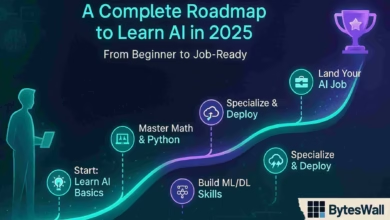How to Become an AI Generalist: A Comprehensive Tech Guide for 2025

Navigating the AI Landscape as a Generalist
Artificial Intelligence (AI) continues to reshape industries in 2025, from healthcare diagnostics to autonomous vehicles and generative art. As AI adoption surges, a new breed of professionals has emerged: the AI Generalist. Unlike specialists who focus on a single domain like deep learning or natural language processing (NLP), AI Generalists are versatile professionals with a broad skill set, capable of tackling diverse AI projects. If you’re a tech enthusiast looking to break into AI or a professional aiming to pivot into a more adaptable role, becoming an AI Generalist could be your path to success. In this tech guide, we’ll explore what an AI Generalist is, why the role matters in 2025, and how you can become one with actionable steps, tools, and resources.
What is an AI Generalist?
An AI Generalist is a jack-of-all-trades in the AI ecosystem. They possess a well-rounded understanding of AI concepts, tools, and applications across multiple domains, allowing them to contribute to various stages of an AI project—from data preparation to model deployment and ethical oversight. Unlike a deep learning specialist or a computer vision expert, an AI Generalist doesn’t dive deeply into one area but instead bridges gaps between specialties, making them invaluable in interdisciplinary teams.
Key Characteristics of an AI Generalist
- Broad Knowledge: Familiarity with machine learning (ML), NLP, computer vision, reinforcement learning, and generative AI.
- End-to-End Skills: Ability to handle data preprocessing, model building, deployment, and integration into applications.
- Adaptability: Capability to pivot between tasks, such as coding a chatbot one day and analyzing AI ethics the next.
- Communication: Skill in explaining AI concepts to non-technical stakeholders, such as business leaders or product managers.
- Domain Awareness: Understanding of how AI applies to industries like healthcare, finance, education, and entertainment.
Why Become an AI Generalist in 2025?
The AI landscape in 2025 is more dynamic than ever. With advancements like GPT-5’s human-level reasoning capabilities, quantum AI breakthroughs, and stricter AI ethics regulations (e.g., the EU’s 2025 AI Act), the need for professionals who can navigate this complexity is critical. Here’s why becoming an AI Generalist is a smart move:
- Versatility: Work on diverse projects, from building chatbots to deploying image recognition systems.
- Collaboration: Bridge the gap between specialists (e.g., data scientists, engineers) and non-technical teams (e.g., marketing, product).
- Future-Proofing: Adapt to emerging trends like AI for climate tech or quantum machine learning, ensuring long-term career relevance.
- Demand: Job postings for AI Generalists on platforms like LinkedIn have risen by 40% since 2023, according to a 2025 LinkedIn Jobs Report.
How to Become an AI Generalist: A Step-by-Step Tech Guide
Becoming an AI Generalist requires a blend of technical skills, practical experience, and adaptability. Below is a detailed roadmap to guide you through the process, tailored for 2025’s tech landscape.
Step 1: Build a Strong Foundation in AI Fundamentals
Before diving into specialized areas, you need a solid understanding of AI basics. This foundation will help you grasp the broader concepts you’ll encounter as a generalist.
What to Learn
- Core AI Concepts: Supervised learning (e.g., regression, classification), unsupervised learning (e.g., clustering), reinforcement learning (e.g., Q-learning), neural networks (e.g., CNNs).
- Math and Statistics: Linear algebra (matrices, eigenvalues), calculus (gradients, optimization), probability and statistics (distributions, hypothesis testing).
- Programming: Python, libraries like NumPy, Pandas, scikit-learn.
Resources
- Courses: Machine Learning by Andrew Ng on Coursera, Introduction to AI on edX.
- Books: Artificial Intelligence: A Guide to Intelligent Systems by Michael Negnevitsky, Mathematics for Machine Learning by Marc Peter Deisenroth.
- Practice: Kaggle competitions (e.g., Titanic survival prediction), HackerRank coding challenges.
Timeline
3-6 months for beginners; 1-2 months if you have a programming or math background.
Step 2: Explore a Wide Range of AI Subfields
As an AI Generalist, you need exposure to multiple AI domains to handle diverse projects. Here’s a breakdown of key subfields to explore in 2025.
Natural Language Processing (NLP)
- What to Learn: Tokenization, embeddings (e.g., BERT, GPT-5), applications like chatbots, sentiment analysis.
- Tools: Hugging Face Transformers, spaCy.
- Project Idea: Build a sentiment analysis tool for X posts using BERT.
Computer Vision
- What to Learn: Image classification (CNNs), object detection (YOLOv8), applications like facial recognition.
- Tools: OpenCV, TensorFlow, PyTorch.
- Project Idea: Create an image classifier to identify dog breeds using ResNet.
Reinforcement Learning
- What to Learn: Markov Decision Processes, Q-learning, Deep Q-Networks, applications like game playing.
- Tools: OpenAI Gym, Stable Baselines3.
- Project Idea: Train an agent to play CartPole using OpenAI Gym.
Generative AI
- What to Learn: GANs, diffusion models (e.g., Stable Diffusion 3), applications like art generation.
- Tools: Stable Diffusion, PyTorch.
- Project Idea: Generate AI art using Stable Diffusion and host it on Hugging Face Spaces.
AI Ethics
- What to Learn: Bias, fairness, transparency (e.g., SHAP), regulations like the EU AI Act (2025).
- Tools: Fairlearn, SHAP.
- Project Idea: Analyze bias in a dataset (e.g., Kaggle’s Adult Income) and propose mitigation strategies.
Resources
- Courses: DeepLearning.AI’s NLP Specialization, Computer Vision Basics on Coursera.
- Blogs: Towards Data Science, xAI Blog (https://x.ai/blog).
Timeline
6-12 months to gain basic proficiency in each subfield.
Step 3: Develop Practical Skills Across the AI Pipeline
AI Generalists need to handle every stage of an AI project, from data to deployment.
Data Handling
- What to Learn: Data cleaning, feature engineering, structured (SQL) and unstructured data (text, images).
- Tools: Pandas, SQL, OpenCV.
- Practice: Clean a dataset on Kaggle (e.g., Titanic) and create new features.
Model Development
- What to Learn: Build and evaluate models using scikit-learn, TensorFlow, PyTorch, hyperparameter tuning.
- Tools: scikit-learn, TensorFlow, PyTorch.
- Practice: Build a spam detection model using scikit-learn.
Deployment
- What to Learn: Deploy models as APIs (Flask, FastAPI), use cloud platforms (AWS SageMaker, Azure ML), MLOps.
- Tools: Flask, FastAPI, Docker.
- Practice: Deploy an iris classification model as an API on Heroku.
APIs and Integration
- What to Learn: Use AI APIs (e.g., Google Vision API, xAI API at https://x.ai/api).
- Practice: Build a web app using Google Vision API to label images.
Resources
- Courses: MLOps Fundamentals on Udemy, Deploying Machine Learning Models on Coursera.
- Tutorials: FastAPI docs, AWS SageMaker tutorials on YouTube.
Timeline
6-12 months to master the pipeline.
Step 4: Gain Domain Knowledge and Interdisciplinary Skills
AI Generalists often work in specific industries, so understanding domain applications is key.
What to Learn
- Healthcare: AI for diagnostics, drug discovery (e.g., DeepMind’s AlphaFold 3).
- Finance: Fraud detection, algorithmic trading.
- Education: Personalized learning, AI tutors.
- Business Acumen: Translate AI into business value.
- Communication: Explain AI concepts to non-technical stakeholders.
Resources
- Case Studies: McKinsey Insights on AI in healthcare, IBM’s AI blog for finance.
- Courses: AI for Everyone by Andrew Ng on Coursera.
- Networking: Follow AI thought leaders on X.
Timeline
3-6 months to gain basic domain knowledge.
Step 5: Work on Diverse Projects and Build a Portfolio
Hands-on experience is crucial to becoming an AI Generalist.
Project Ideas
- Chatbot: Build a customer service chatbot using Hugging Face’s BERT model.
- Image Recognition: Create an app to identify objects using YOLOv8.
- Recommendation System: Develop a movie recommender using collaborative filtering.
- Generative AI: Generate AI art with Stable Diffusion 3 on Hugging Face Spaces.
- Ethics Analysis: Analyze bias in a dataset using Fairlearn.
How to Showcase
- Host projects on GitHub with detailed READMEs.
- Deploy live demos on Hugging Face Spaces or Heroku.
- Write blog posts on BytesWall or Medium about your projects.
Timeline
6-12 months to complete 3-5 projects.
Step 6: Stay Updated and Adaptable
AI evolves rapidly, and generalists must stay current.
What to Do
- Follow research on arXiv for the latest AI papers.
- Read tech blogs: TechCrunch, MIT Technology Review, xAI Blog.
- Experiment with new tools: GPT-5 updates, quantum AI frameworks.
Resources
- Newsletters: Import AI, The Algorithm by MIT Tech Review.
- Communities: r/MachineLearning on Reddit, AI Discord servers.
- Events: NeurIPS 2025, AI Summit 2025.
Timeline
Ongoing commitment (1-2 hours per week).
Step 7: Consider Certifications or Formal Education (Optional)
Certifications can validate your skills.
Options
- Certifications: Google Professional Machine Learning Engineer, AWS Certified Machine Learning – Specialty.
- Programs: Springboard’s AI/Machine Learning Career Track.
Timeline
3-6 months per certification.
Step 8: Gain Experience Through Jobs or Freelancing
Apply your skills in real-world settings.
What to Do
- Jobs: Apply for roles like AI Analyst, Data Scientist.
- Freelancing: Offer services on Upwork (e.g., building AI models).
Resources
- Job Boards: LinkedIn, Indeed, xAI Careers (https://x.ai/careers).
- Freelancing: Create an Upwork profile with your portfolio.
Timeline
6-12 months to land your first role or freelance gig.
Downloadable AI Generalist Starter Kit
To kickstart your journey, we’ve created an AI Generalist Starter Kit with a curated list of resources, project templates, and a learning roadmap. Download it below to get started.
Download Your AI Generalist Starter Kit
Download PDFThe Future of AI Generalists
The innovations of 2025 are setting the stage for AI Generalists to thrive. From GPT-5 to quantum AI, these professionals are at the forefront of innovation, bridging gaps and driving impact across industries. By following this guide, you can become a versatile AI professional ready to tackle the challenges of tomorrow.
BytesWall: Empowering the Next Generation of AI Generalists
Join the AI Generalist Community
Which step are you starting with? Share your journey in the comments and join the conversation with #AIGeneralist2025!
Explore more AI insights at BytesWall.com—your hub for tech career guides!


